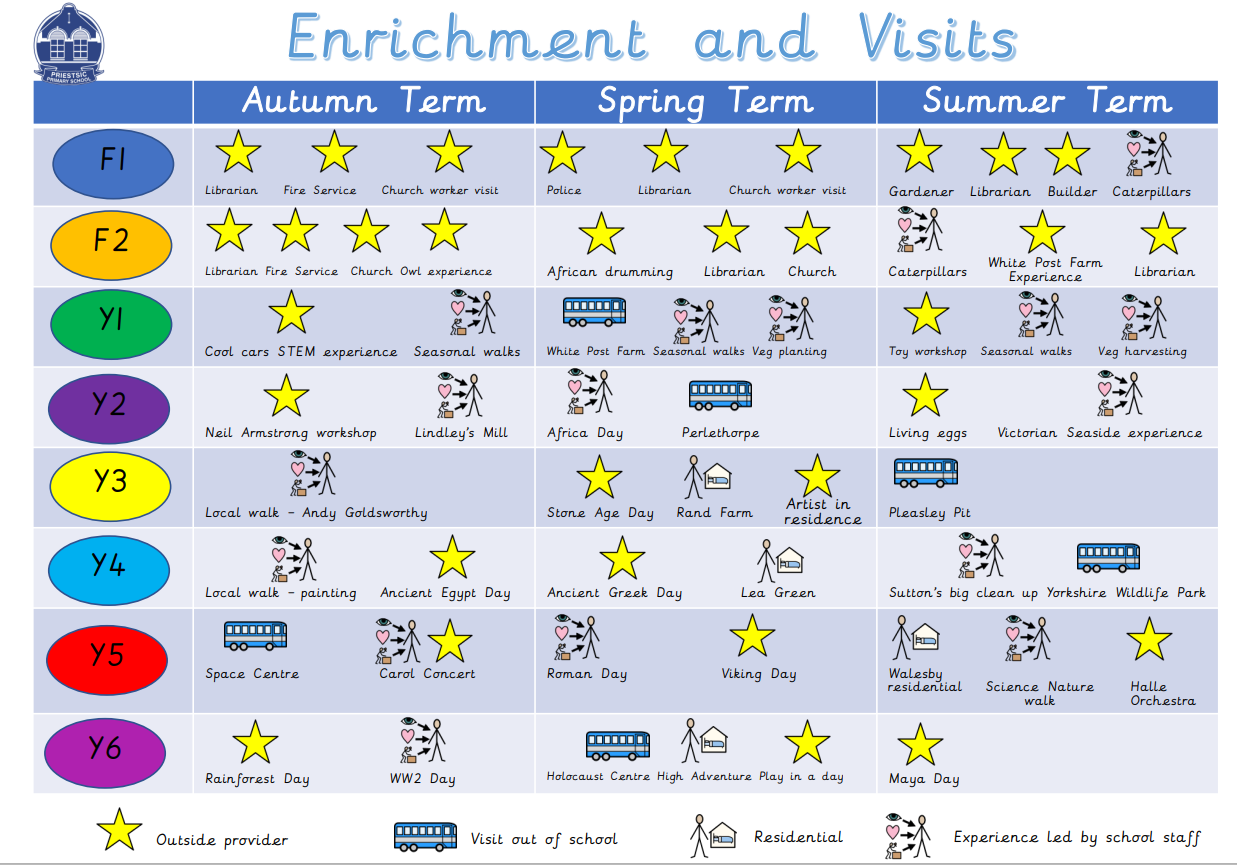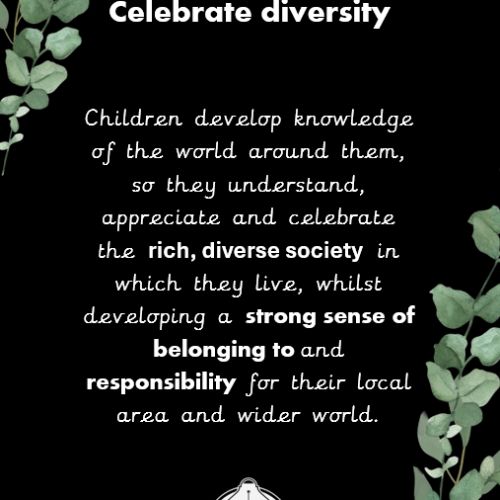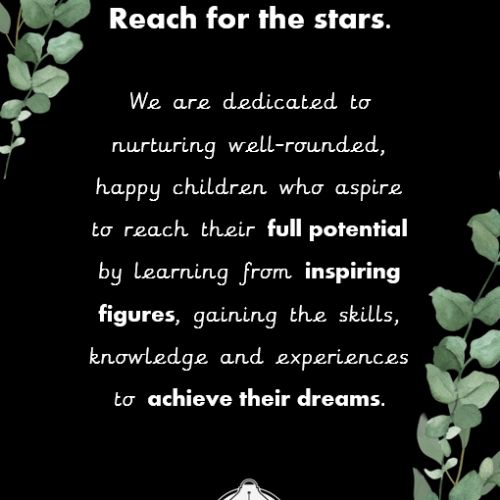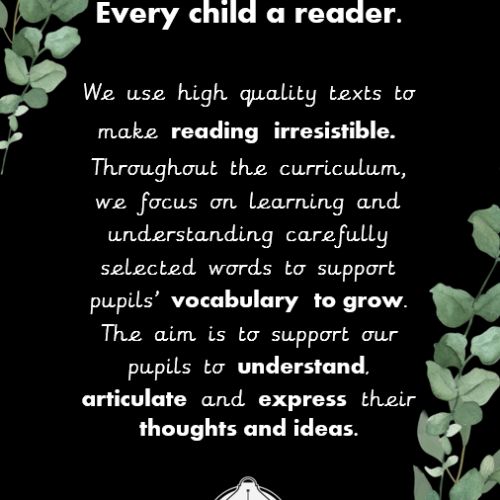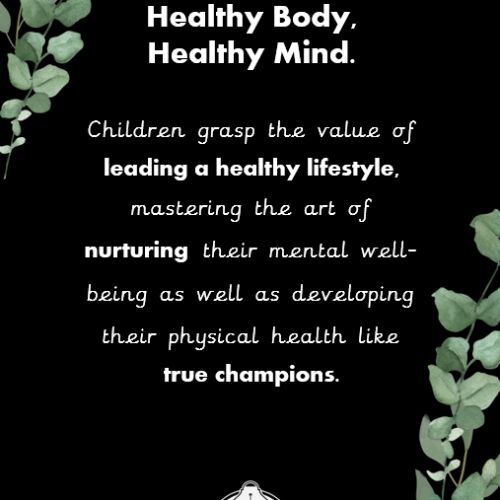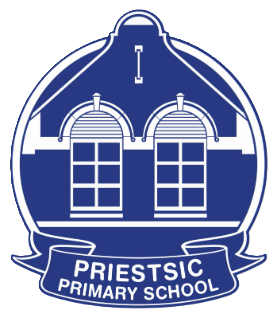
Priestsic Primary and Nursery School
Aspire, Believe, Achieve
Priestsic Primary and Nursery School
Priestsic Primary and Nursery School Park Street Sutton-in-Ashfield Nottinghamshire NG17 4BB
Telephone:
Email:
Curriculum
Our Curriculum
At Priestsic Primary and Nursery School, we have created a curriculum based around four main curriculum drivers:
- Diversity
- Aspiration
- Vocabulary
- Health and well-being
We have designed a curriculum which is bespoke to our children, in our community.
We want our children to:
- Learn about and from the lives of inspirational people in order to have high aspirations for themselves and their futures
- Understand, appreciate and celebrate the rich and diverse society in which they live in modern day Britain whilst developing a strong sense of belonging to and responsibility for their local area and the wider world
- Have a rich vocabulary, developed through a love of reading and books, to help them to understand, articulate and express their thoughts and ideas
- Appreciate the importance of leading healthy lives, understanding how to take care of their physical and mental well-being and how to have healthy, loving relationships
To find out more about our curriculum, please visit our class pages to see what fantastic learning our children have been doing. Alternatively, click on the icons below to find out more about a particular subject. If you have any questions regarding the curriculum we teach, please contact the school directly.
Our curriculum at a glance:
Curriculum development:
We have reviewed our subject progression documents and strand progression summaries to ensure that our learning is sequential and progressive. We use these to plan our learning, regularly retrieving prior learning in order to build knowledge and use this to develop skills.
Please find below information about specific subjects as well as our curriculum overviews for each year group.
Long Term Curriculum Framework
Accordion content
Curriculum Intent
Our Curriculum Purpose
Curriculum Progression Maps
We have reviewed and updated our curriculum to make sure that it delivers on our curriculum intent. We are passionate about giving our pupils the very best learning experience that we can.
To help us ensure that our pupils are acquiring knowledge and, therefore, developing skills in a progressive sequence, we have developed subject progression maps and subject strand progression summaries. We revisit and revise previous learning and build on it in our lessons to ensure that we embed key knowledge.
Please find our subject progression documents below:
- Computing Curriculum Progression Map
- Science Curriculum Progression Map .pdf
- Music Curriculum Progression Map .pdf
- PE Curriculum Progression Map .pdf
- Art and Design Progression Map.pdf
- Geography Curriculum Progression Map .pdf
- Mathematics Curriculum Progression Map.docx.pdf
- Religious Education Curriculum Progression Map.pdf
- Design and Technology Curriculum Progression Map.pdf
- History Curriculum Progression Map .pdf
- Reading Curriculum Progression Map .pdf
- French Curriculum Progression Map .pdf
- Spoken Language Curriculum Progression Map .pdf
- Writing Curriculum Progression Map .pdf
Our Curriculum Overviews
In this section you will find our yearly curriculum progression documents.
English
Accordion content
Maths
Why Maths is Important
Maths is an essential skill that enables us to live an independent life. It teaches us how to make sense of the world around us, whether it be: calculating the total amount of money we need to purchase items, knowing what time to meet a connecting train or weighing precise amounts of ingredients when following a recipe. Maths helps us to develop problem solving and reasoning skills that allow us to solve a variety of problems in our every day lives.
National Curriculum Purpose of Study
Mathematics is a creative and highly inter-connected discipline that has been developed over centuries, providing the solution to some of history’s most intriguing problems. It is essential to everyday life, critical to science, technology and engineering, and necessary for financial literacy and most forms of employment. A high-quality mathematics education therefore provides a foundation for understanding the world, the ability to reason mathematically, an appreciation of the beauty and power of mathematics, and a sense of enjoyment and curiosity about the subject.
What Maths Looks Like At Priestsic Primary School
Our main aims at Priestsic Primary are to make our children fluent in solving calculations involving the four mathematical operations and to equip them with the tools to solve a variety of problems. The units of work are, by necessity, organised into distinct areas, but pupils will make rich connections across mathematical ideas. Developing problem solving and reasoning skills is a thread that runs through all our Maths lessons. Children are constantly challenged to explain why, to prove how they know, to convince that they are correct or to find all possible outcomes. They have the opportunity to use a wide range of resources to support their learning such as hundred squares, number lines, Numicon, cubes, place value cards and other small apparatus as we follow a CPA approach in our delivery. Mathematical skills are developed across the curriculum in subjects such as Science, Design and Technology and PE. Vocabulary is explicitly taught at the beginning of every lesson and in order to facilitate children to know more and remember more key concepts run through the whole of our curriculum and opportunities to revisit previous learning are planned into every lesson.
A Mastery Approach and what it looks like at Priestsic
A Mastery Approach - What it looks like at Priestsic.pdf
Working Walls
The main purpose of the working walls at Priestsic is to support children in their current learning and enable independence.
Every classroom across the school has a mathematics working wall in it. Working walls are adapted for each age group. There are general principles for the working walls that have been agreed with teachers across the school:
• Key facts are put on the wall at the beginning of the week and then built on.
• The working walls are constructed with pupils and built on together.
• Examples of effective work are put on the wall (WAGOLLs)
• The success criteria/steps to success for a calculation is written with the pupils, rather than given to them.
• Key vocabulary is readily available and teachers expect children to use the vocabulary during maths talk and their written answers.
• Summaries and key facts from previous learning is also available on the working walls for children to refer to.
One Key Stage 2 pupil explains, “In maths, the teacher takes a problem and then shows us how she works it out. Then she puts it on the wall. That’s really helpful to look at.”
“The working wall is a ‘third teacher’ in the room. The children know that they can use it for support, if they are not sure or need to deepen their learning.”
Maths in Foundation Stage and Key Stage One
We follow the CPA approach in Maths. Children have lots of opportunities to, 'build it, draw it and solve it' in order to deepen their understanding of Maths concepts. We have Maths areas in every classroom in Foundation Stage and Key Stage One which allow pupils to practise, consolidation and apply their developing knowledge and skills. Our environments also provide opportunities to explore and have fun with Maths. Measuring, ordering and comparing opportunities are provided through continuous provision, as well as in other subjects, where we explicitly plan where children can apply their mathematical thinking.
Maths in Key Stage 2
We follow the CPA approach in Maths. Children have lots of opportunities to, 'build it, draw it and solve it' in order to deepen their understanding of Maths concepts. We have Maths enable tables in every classroom throughout Key Stage 2 which allow pupils to build their independence and resilience skills, as these tables are full of resources, equipment, worked examples etc. to help the children be successful on their own.
Maths Across the Curriculum
Being numerate involves more than mastering basic mathematics. Numeracy involves connecting the mathematics that children learn at school with the out-of-school situations that require the skills of problem solving, critical judgement, and sense-making related to applied contexts.
Here at Priestsic we plan for opportunities where our children can apply what they have learnt in Maths lessons to other contexts - helping them to realise the importance of Maths and why it is needed.
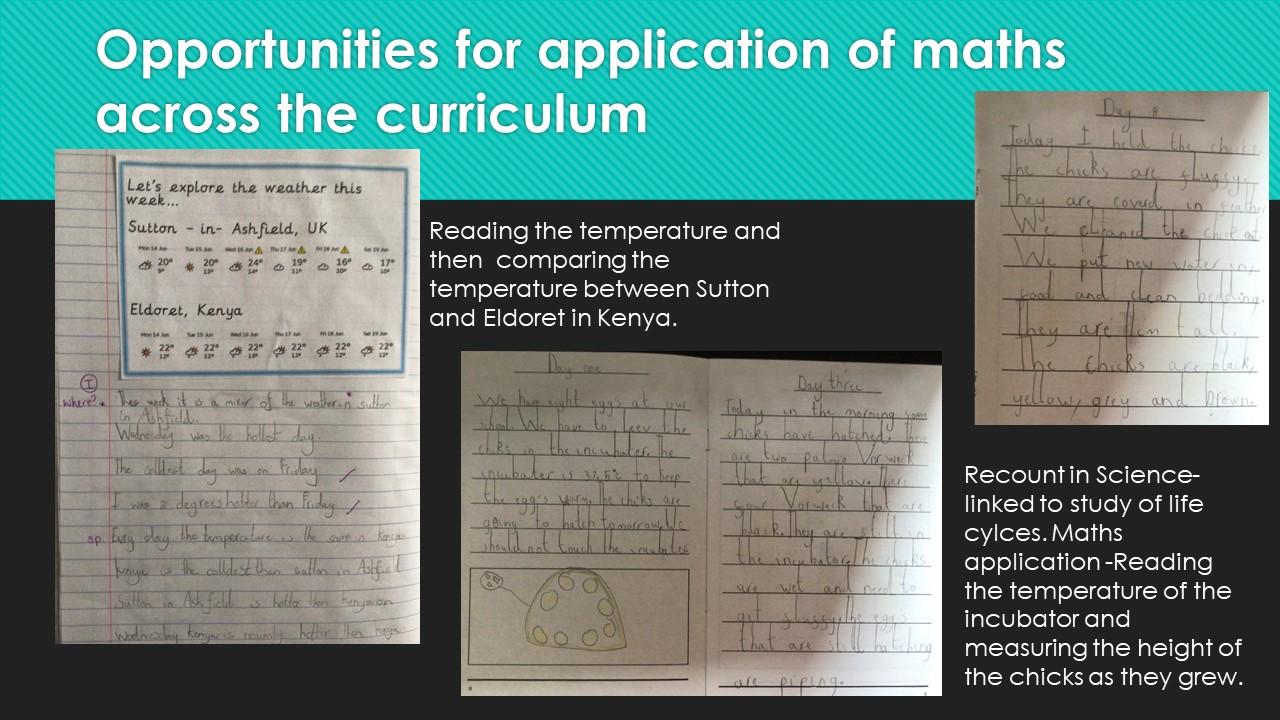
Going Deeper in Maths...
In order to make provision for children working at greater depth we have ensured to:
•Model higher-level reasoning skills (justification and proving) and encouraged children to use them;
•Model mathematical questioning during open-ended Maths problems and encourage children to ask them themselves
•Provide complex Maths problems (open and closed) with a variety of contexts and supported children initially to access these, until they were able to do them independently;
•Motivate children to be confident and resilient enough to do the above.
What our children say...
What our children think about what they are learning is incredibly important to us; they are at the heart of our curriculum. Pupil voice activities are carried out numerous times throughout the course of the year to ascertain what is working well and how things can be improved. The children's opinions, along with staff's inform the Maths subject action plan.
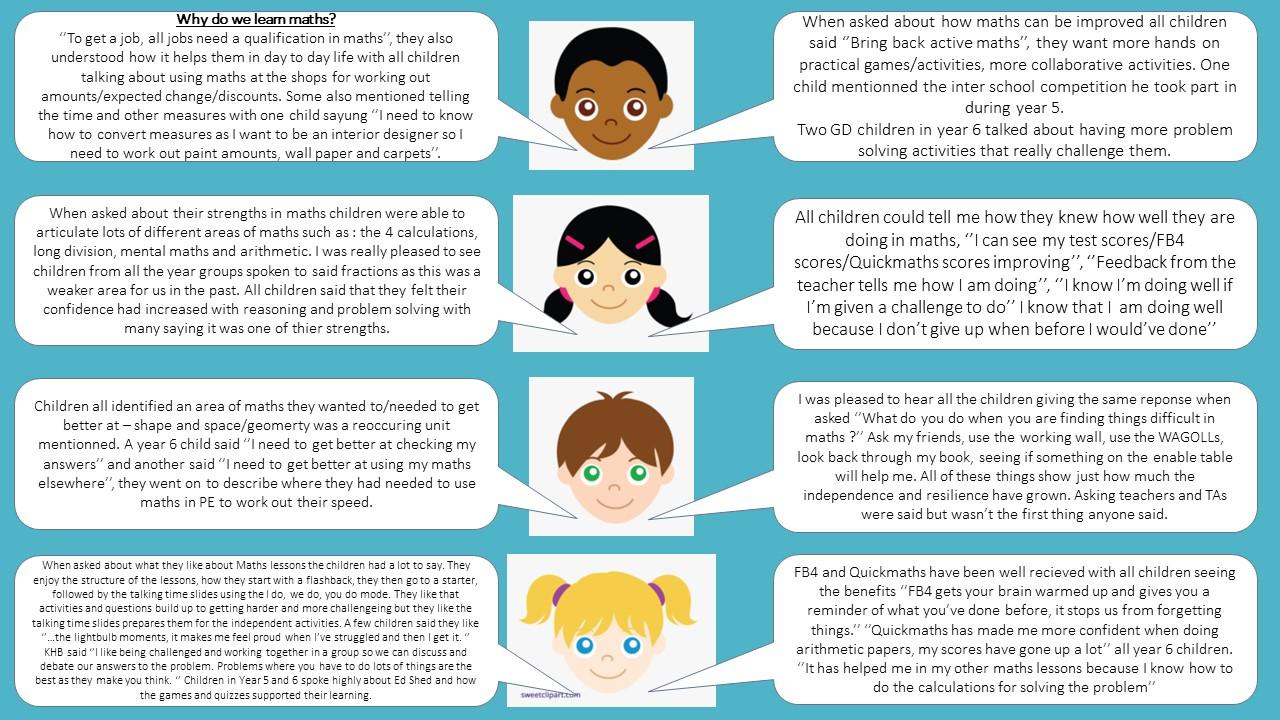
Science
At Priestsic Primary School, we teach our pupils to be curious about the world around them and develop their knowledge and understanding of important scientific ideas, processes and skills through first hand experiences and also through developing a rich knowledge.
EYFS
At Priestsic Primary and Nursery School, we provide our pupils with an Early Years Foundation Stage curriculum that gives them the building blocks for their education and embeds the knowledge and the skills they will require to be ready for school and develop a love of learning. Our curriculum provides children with first hand experiences and practical opportunities to explore, find out more, develop their natural curiosity and become highly engaged in their learning. The curriculum supports children to use their imagination and creativity to develop their thinking through finding their own ways to solve problems and individual approaches to activities.
Children learn through our inviting, safe, calm and stimulating learning environments where they have opportunities to learn through play by initiating their own ideas with the continuous provision indoors and outdoors and through adult support, scaffolding and modelling. We support all pupils through developing strong relationships with them and equipping them with the skills they need to interact with their peers and adults.
Our curriculum is driven by raising aspiration for all, celebrating diversity, improving vocabulary and promoting health and well-being.
Our school values provide a basis for developing key personal skills necessary for a successful learning journey now and in the future - self-belief, independence, kindness, responsibility, respect and resilience.
Continuous Provision
Learning through Play with our Continuous Provision
At Priestsic Primary and Nursery School, we know that children in the Early Years Foundation Stage and Key Stage One learn best through play and exploration where they can experience learning for themselves. Through our continuous provision, our children get daily opportunities to be an artist, writer, mathematician, scientist, performer, architect, designer, storyteller and many more. From their play and experiences, our children are able to consolidate their skills, knowledge and understanding which enables them to be become independent and resilient learners, as well as develop a love for learning. Through our indoor and outdoor environments, children are busy and actively engaged in a wide range of activities that they themselves have chosen. The role of the adult during this time is to interact with the children to support, model, question, observe and challenge the children as necessary in order to move their learning on.
Our classroom environments are organised to promote and develop continuous provision and provide our children with opportunities to make their own choices, initiate their play and carry out their own ideas. Our resources are labelled and displayed on open shelves and units so children have free and easy access. In addition, the provision enables children to return to their previous learning to consolidate their skills and knowledge and build on it further.
Art and Design
At Priestsic School, we develop children’s skills, knowledge and talents by recording what they have experienced, seen, felt and imagined. We do this using a range of materials, techniques and tools through studying a rich variety of artists, crafts people and designers. We deliberately make links with other curriculum subjects, at times, to enable art and design to be both studied for joy, freedom of expression and creativity but also purposefully through exploration of links in learning to other subjects such as; Maths, English and History.
British Values / SMSC
Central to our school’s ethos is the idea that each child should be prepared for living life in modern Britain.
This is achieved through embedding British Values (BV) and Spiritual, Moral, Social and Cultural Development (SMSC) throughout the curriculum.
The spiritual, moral, social and cultural development of each child is recognised as being of fundamental importance for the education of all children by Governors, staff and parents of our school. It is taught not only through all subjects, in particular Religious Education (R.E.) and Personal, Social, Health and Relationship education (PSHRE), but also through the school ethos.
It supports all areas of learning and can contribute to the child’s motivation to learn. It is recognised that such development will be most successful when the values and attitudes promoted by the staff provide a model of behaviour for the children. To support our teaching of British Values and enhance our SMSC ethos, we not only promote these values through our curriculum, we explicitly teach specific values each half term. This helps our children to understand some key values and identify that many of the same values are important for people regardless of background, culture, faith or beliefs.
At Priestsic Primary and Nursery School we recognise the importance of our role in developing children’s awareness and acceptance of others. We also recognise that some of their existing knowledge or beliefs in regards to the protected characteristics need challenging. We do this by educating them in an age appropriate way, showing children that regardless of background they share many similarities and that everyone can be both successful and achieve.
We continually review the needs of our children, our community, as well as current global issues, so that we can plan careful learning opportunities and experiences that will prepare our children with values for life.
Throughout all subjects we ensure that children are taught to challenge stereotypes and are educated to value and respect differences; including those reflected within the nine protected characteristics. With this in mind, texts, story books and significant people as understudies (across all subjects), are carefully chosen to provide our children with opportunities for discussion in order for them to learn and appreciate that differences are not a barrier to relationships, achievement or success.
What is SMSC?
Spiritual Development relates to the quest for individual identity and the search for meaning and purpose in our existence. It is associated with a dimension of life which is not necessarily experienced through the physical senses, but has much to do with feelings and emotions, and attitudes and beliefs. Spiritual development is not solely linked to a particular doctrine or faith and is therefore accessible to everyone.
Moral Development is concerned with fundamental decisions about how we should behave and act and the reasons for such behaviour and decisions. It relates to the child’s developing understanding of what is ‘right’, ‘wrong’ and ‘fair’. Moral development in school tries to build upon the child’s experience in the home, accepting that there might be different approaches between home and school.
Social Development is concerned with the skills and personal qualities necessary for individuals to live and function effectively in society. In school we build on and support the functions of the home and wider community by helping to prepare our children to live in society.
Cultural Development allows the child to recognise that all cultural groups are distinctive. Culture is the embodiment of shared beliefs, knowledge, customs and values of that group. The child needs to appreciate the distinctive features of their own culture and those of others. This will help children to answer the questions “Who am I?” and “Where do I fit in?”
What are British Values?
- Democracy
- Rule of law
- Individual liberty
- Mutual respect
- Tolerance of those of different faiths and beliefs
Being Part of Britain
As a school we value and celebrate being part of Britain. In general terms, this means that we celebrate traditions and customs throughout the year; including, harvest festival, Remembrance Day, May Day, Easter services and Christmas celebrations! We also value and celebrate national, charity and sporting events.
Learning about being part of Britain is also part of our school curriculum and is taught in Early Years as they learn to understand the World they live in and through both Geography and History at Key Stage 1 and 2 (KS1).
Democracy
Children, parents and staff have many opportunities for their voices to be heard
Obvious examples are our school council and eco school committee. The election of the School Council members and eco committee members reflects our British electoral system and demonstrates democracy in action: candidates explain why they would like the role, pupils consider characteristics important for an elected representative and pupils vote in secret.
Other examples of ‘pupil voice’ are:
- Children choose their own dojo rewards for when they achieve their class target.
- Children are regularly asked their opinions by different subject leaders and SLT to further improve subjects and areas within the school.
- Pupils are always listened to by adults and are taught to listen carefully and with concern to each other, respecting the right of every individual to have their opinions and voices heard. One of our school values is respect.
The Rule of Law.
The importance of rules and laws, whether they be those that govern our school or our country, are referred to and reinforced often, such as in assemblies and when reflecting on behaviour choices. The school has a set of values which children learn and follow from Nursery. Rewards and sanctions are consistent throughout the school to encourage children to follow these values.
Children are taught the value and reasons behind laws, that they govern and protect us, the responsibilities that this involves, and the consequences when laws are broken.
These values are reinforced in different ways, including:
- Visits from authorities such as the police and fire service.
- During Religious Education, when rules for particular faiths are thought about.
- During other school subjects, where there is respect and appreciation for different rules (in a sports lesson, for example).
Individual Liberty
Alongside rules and laws, we promote freedom of choice and the right to respectfully express views and beliefs. Through the provision of a safe, supportive environment and empowering education, we provide boundaries for our young pupils to make choices safely; for example:
- Choices about what learning challenge or activity.
- Choices around the participation in extra-curricular activities.
- Our pupils are encouraged to know, understand and exercise their rights and personal freedoms and are taught how to exercise these safely, such as in our e-safety lessons.
Mutual respect and tolerance of those with different faiths and beliefs:
Our pupils know and understand that it is expected and imperative that respect is shown to everyone, whatever differences we may have, and to everything, whether it is a school resource, a religious belief or whatever. Children learn that their behaviour choices have an effect on their own rights and those of others. All members of the school community should treat each other with respect.
This is also enhanced:
- Through Religious Education and other lessons where we might develop awareness and appreciation of other cultures;.
- In English through fiction;.
- In Art, Music and DT by considering culture from other parts of the world.
Children gather daily, either as a class, a key stage or the whole school. These times include carefully planned assemblies to deliver the key British Values themes or themes based on the social and emotional aspects of learning, assemblies to promote religious holidays or times to sing or reflect as a group.
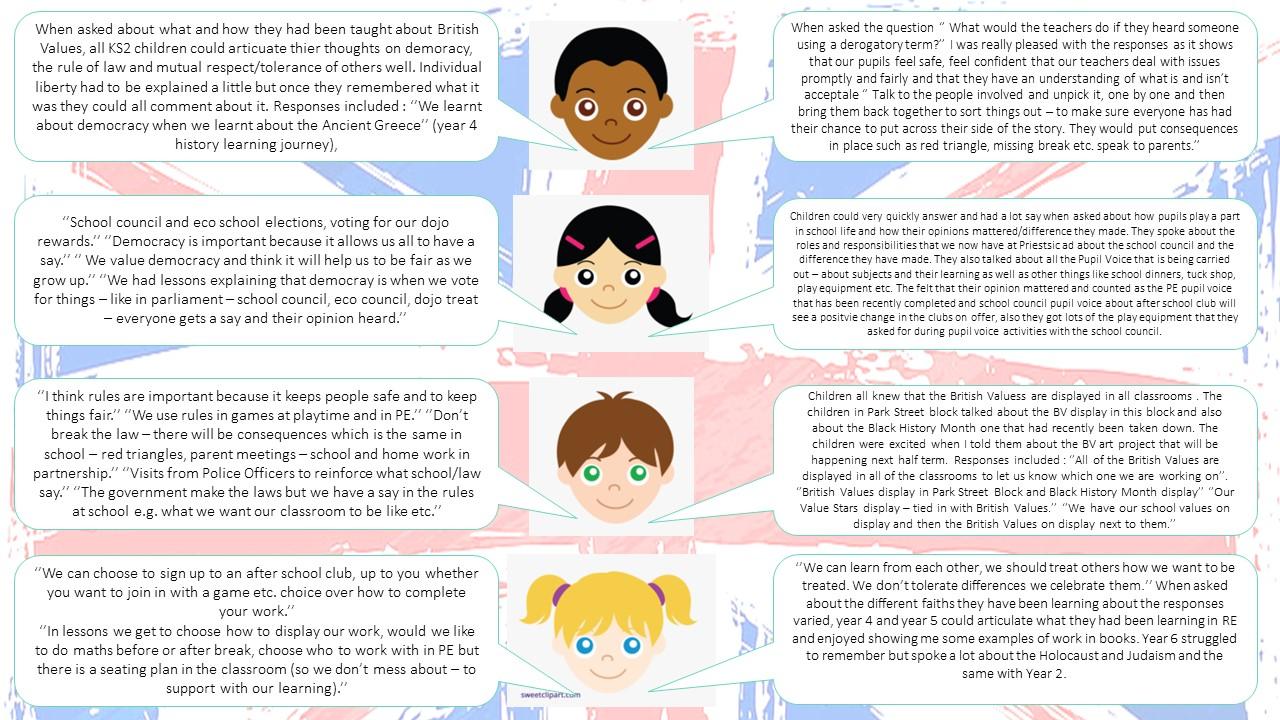
Physical Education
Physical Education at Priestsic
At Priestsic, we value Physical Education. We want them to have no limits to their aspirations, and grow up wanting to be personal trainers, nutritionists, sports journalist or gold medal winners! We enable our pupils to become physically confident in a way which supports both their mental, and physical health and fitness and wellbeing. We encourage positive and inclusive participation in physical education, which will enable children to build self-esteem, team work skills, and positive values and attitudes in P.E. and across the curriculum.
Our PE curriculum has been carefully built and the learning opportunities and assessment milestones for each year group crafted to ensure progression and repetition in terms of embedding key learning, vocabulary, knowledge and skills. In addition to this we provide specialist swimming teaching to pupils in Years 4.
In order to instil a passion within our children for keeping active, we also offer a range of extra-curricular clubs throughout the school year.
Here is our PE Overview:
Geography
At Priestsic Primary School we are all geographers!
During a child's journey through Priestsic Primary School, they will develop knowledge and skills through a concept driven curriculum deepening their understanding of the world.
In EYFS, the children are encouraged to observe, explore and investigate the world around them. In KS1 and 2, geographical concepts are explored further, building a love of and respect for both the built and natural world. To encourage this respect for nature and the environment, we provide our children with a range of field trips and over night residentials.
We encourage our children to learn through practical situations where ever possible, encouraging them to develop their field work and mapping skills. During the year, we map out and recording all the amazing places we meet in our curriculum studies. To help us know more and understand more, there is a sharp focus on learning the subject -specific vocabulary relating to the human and physical aspects of geography.
Another vital concept that has been developed in our curriculum is that of climate change and the role our children can play in tackling this. The children are encouraged to take an active role in this, seeing themselves as the driving force for change. We encourage all our pupils to express their opinions, get involved and take responsibility for their world.
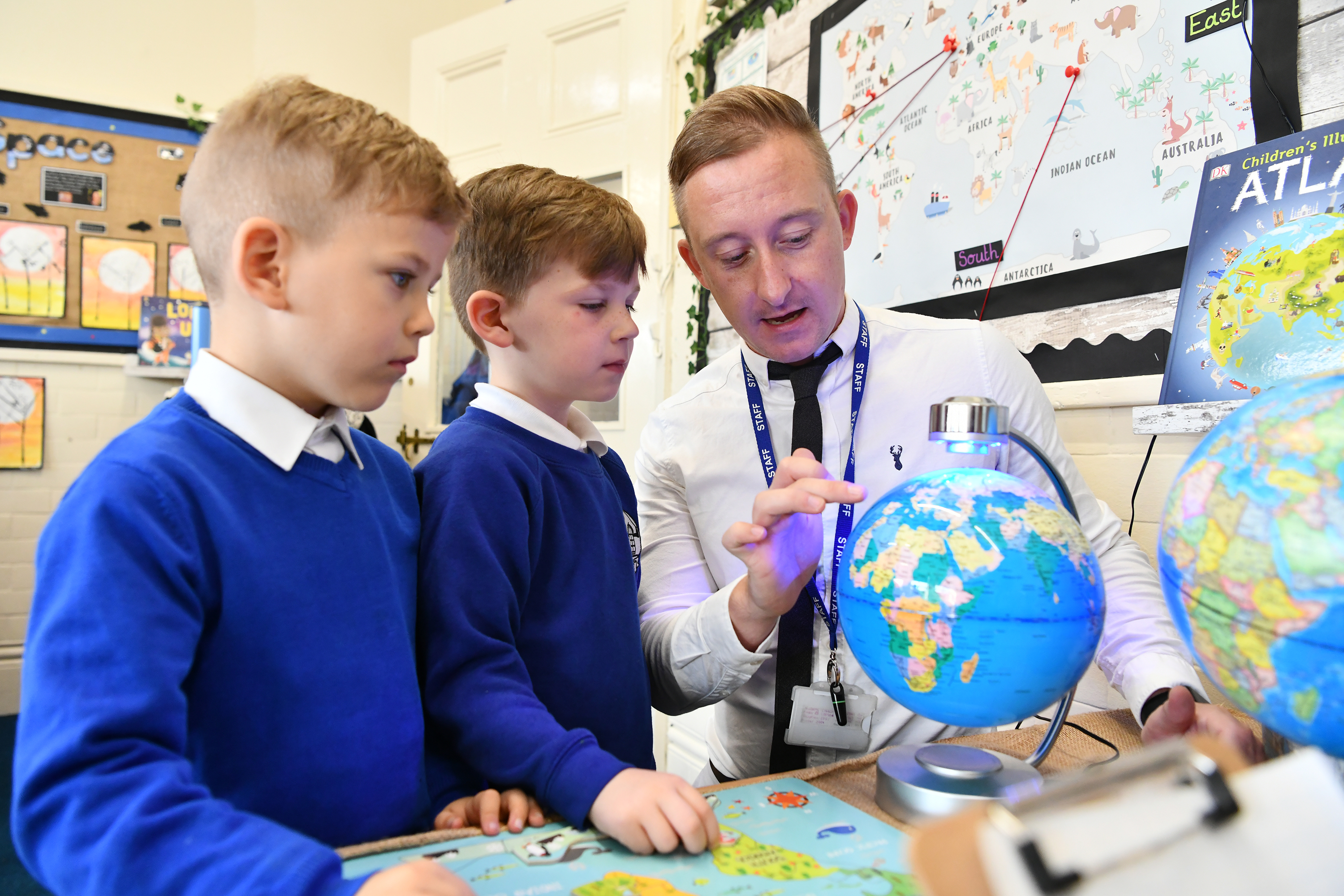
Design and Technology
Design and technology, like science, helps children to make sense of the world in which they live and the fact that it is all around them in the form of buildings, structures, shapes and materials. The three main elements of design and technology in our school are: Refining and Improving Ideas; Increasing Skill, Dexterity and Accuracy in Using Tools, Equipment and Materials and The Ability to Reflect on and Evaluate the Effectiveness of Products. We also study the importance of Health and Safety, especially when using tools.
Broadly speaking, the six main strands in this subject are: STRUCTURES, ELECTRICALS AND ELECTRONICS, MECHANICS, TEXTILES, COOKING and NUTRITION and MATERIALS. Each of these strands has a theme or question to be explored and investigate. It can be a wonderful 'tool' for weaving subjects together and bringing learning alive!
From our earliest pupils, we develop pupils' technical knowledge through building structures and exploring how different mechanisms work. Pupils also start learning to cook food and investigate nutrition. In addition, they start to learn the basic principles of healthy eating and understand where an increasing range of food comes from.
In Key Stage Two, children build and expand on the technical knowledge they acquire and use a range of mechanical systems in their products, including electrical devices and components. In Upper Key Stage Two, computing is also used to program, monitor and control their products. Children also learn to refine a range of cooking techniques and learn in more depth about the principles and importance of a varied and balanced diet. Furthermore, children examine seasonality as well as explore how ingredients are sourced, grown, reared, caught and processed.
Priestsic Primary and Nursery School strives to equip children with the design, making and evaluative skills to understand our modern and fast-changing world and have a positive future impact on it through becoming creative and versatile thinkers!
Computing
At Priestsic, we equip our children with the skills to be computer-literate by the time they leave us. We do this by entwining the three strands of computing; computer science, information technology and digital literacy, throughout our curriculum. We aim for all children to have the skills needed to become active citizens of a digital world.
In Foundation and Key Stage 1, children are taught to create simple programs with plugged-in and unplugged devices, and debug them when errors arise, understand simple algorithms and can use technology safely and respectfully. We teach our children about being safe online in an ever-growing online world.
In Key Stage 2, children build on their skills by designing, writing and debugging programs that accomplish a set goal. They develop an understanding of computer networks, both locally, accessing and saving files, and worldwide using the internet. Children are taught to use the internet safely, to research topics and evaluate the effectiveness of digital content. Throughout the wider curriculum, children have the opportunity to present their work using a range of programs.
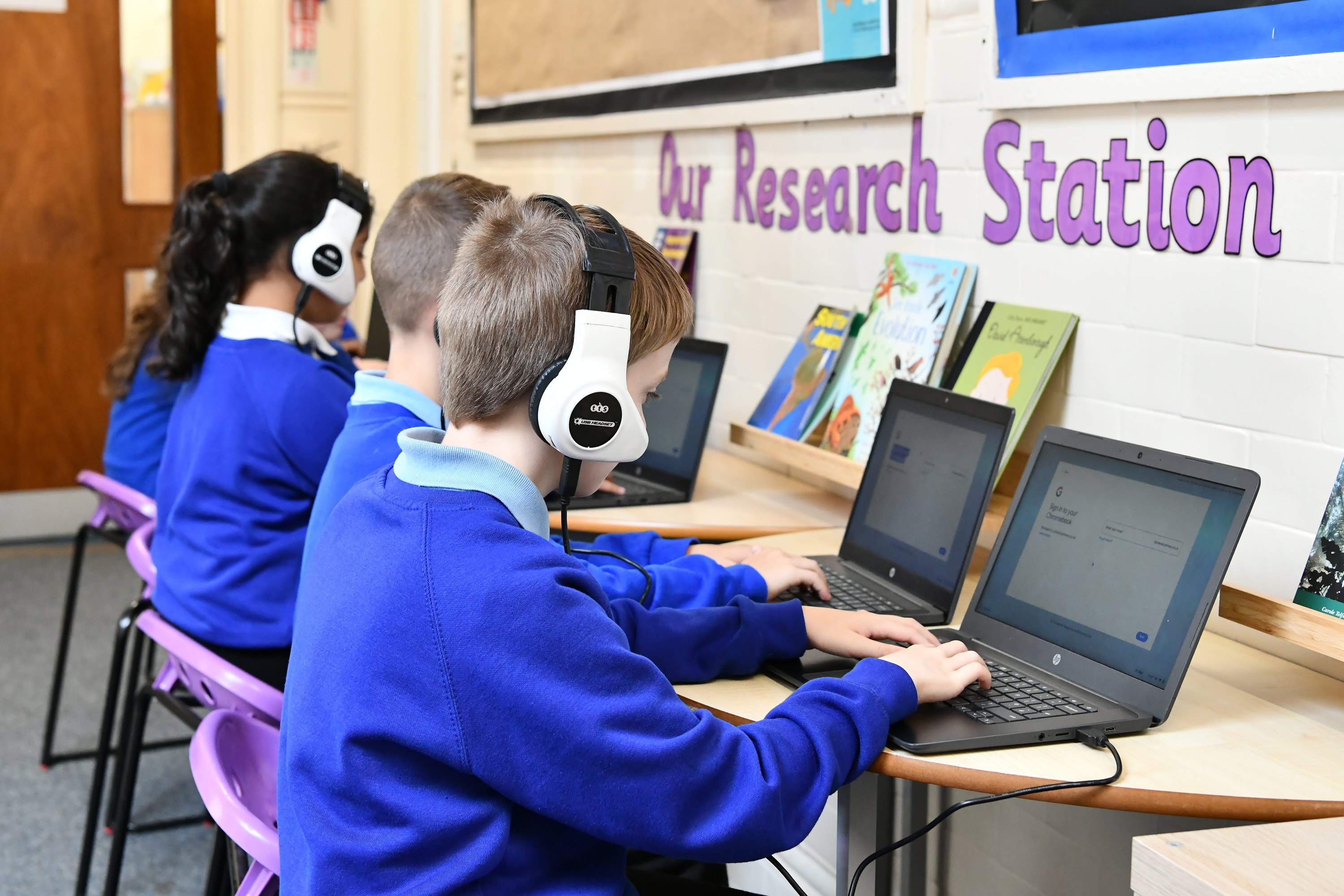
Modern Foreign Languages
In Key Stage Two, our children are taught to speak, read and write in French. Our Modern Foreign Languages (MFL) Curriculum aims to provide children with an opportunity to deepen their knowledge of the world and other cultures. Children are taught to express their ideas and thoughts in another language and to communicate for practical purposes. Our teaching provides the foundation for beginning to learn a foreign language, equipping pupils to further study this and other languages at Secondary School.
All classes will have access to a very high-quality foreign languages curriculum using the La Jolie Ronde scheme of work and resources. This will progressively develop pupil skills in foreign languages through regularly taught and well-planned weekly lessons. Though teachers are encouraged to use the programme’s planning and differentiated resources, it is important to assess these and adapt them where necessary. Therefore, lessons offering appropriate levels of challenge and differentiation will be taught at all times to ensure pupils learn effectively, continuously building their knowledge of and enthusiasm for French.
Units, where possible and appropriate, will be linked to class topics and cross curricular themes. Children will build on previous knowledge gradually as their French lessons continue to revisit, revise and consolidate previously learnt language whilst building on all four language skills (listening, speaking, reading and writing).
PSHRE

Our school is using the Talking Points schemes of work to deliver the government guidance on Health and Relationships education. It uses picture books as a starting point to get children talking about their own health and mental wellbeing as well as addressing other issues such as managing money and understanding democracy. Its aim is to develop children’s understanding of themselves, their emotions and how to deal with others. It also teaches children how to stay safe in many situations and who to speak to if they are ever worried or concerned.
See below for information for each year group.
Stories are subject to change if correct books cannot be sourced.
Talking Points Information for Parents:
- Year 1 Information.pdf
- Year 2 Information.pdf
- Year 3 Information.pdf
- Year 4 Information.pdf
- Year 5 Information.pdf
- Year 6 Information.pdf
- guidance-coverage-ks1-and-2.pdf
In Early Years PSHRE will continue to be taught in the same way; through provision and focus times.
The content is formed from two main areas of Development Matters: Personal, Social and Emotional Development and Health and Self-Care.
Relationship and Sex Education (RSE)
After extensive research, we have invested in the Christopher Winter Project resources to support our delivery of the RSE curriculum. Something that came from the parent consultation that was carried out earlier in the academic year was that parent's wanted to see the schemes of work that we follow and exactly what their children will be learning about. Attached below are the overviews for Years 1 through to 6.
RSE Curriculum Overviews
- Year 1 SOW RSE.pdf
- Year 2 SOW RSE.pdf
- Year 3 SOW RSE.pdf
- Year 4 SOW RSE.pdf
- Year 5 SOW RSE.pdf
- Year 6 SOW RSE.pdf
PSHRE in Action at Priestsic...
The photos below highlight the progression of our PSHRE curriculum as children move through the school; continually revisiting and recall on previously taught themes and learning and building on them in an age appropriate way.
What our children say...
What our children think about what they are learning is incredibly important to us; they are at the heart of our curriculum. Pupil voice activities are carried out numerous times throughout the course of the year to ascertain what is working well and how things can be improved. The children's opinions, along with staff's inform the PSHRE subject action plan.
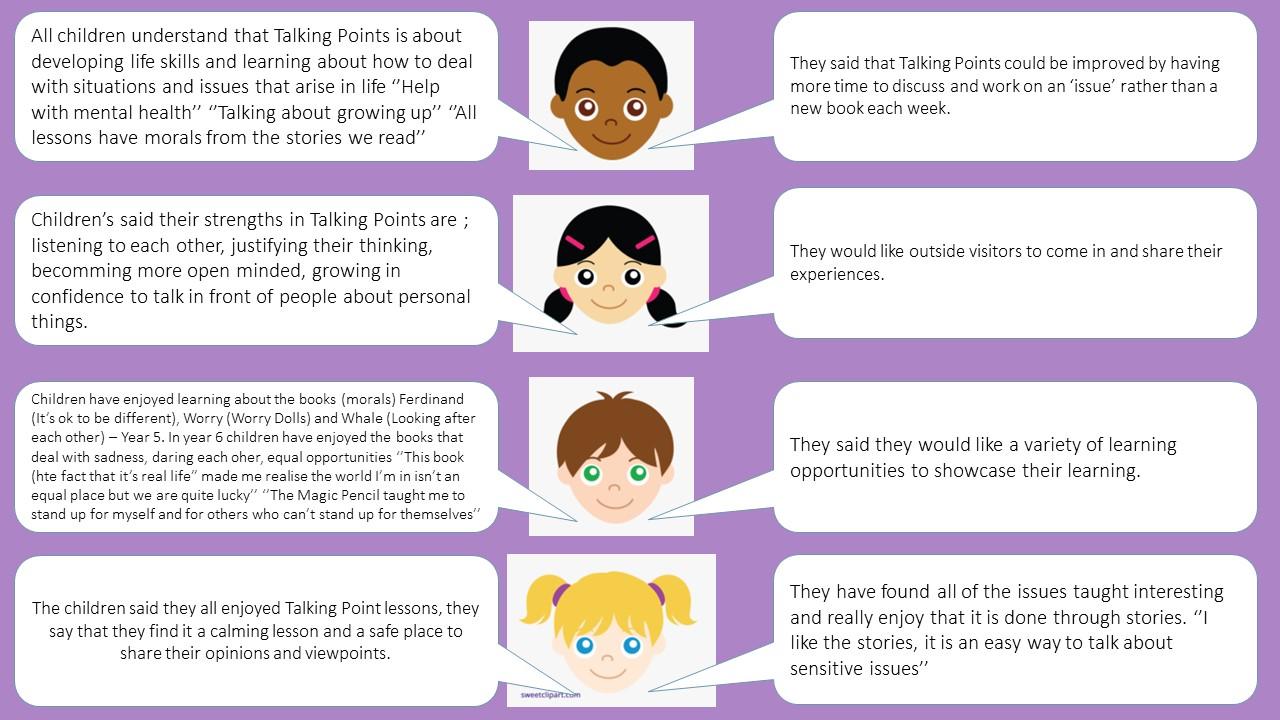
Music
Music can make a powerful contribution to the education and development of children, having benefits which range from those that are largely academic to the growth of social skills and contribution to overall development. It is a unique form of communication that can change the way pupils feel, think and act. Ofsted say that children’s involvement in music engages and re-engages pupils, increasing their self-esteem, and maximising their progress in education and not just in music.
At Priestsic Primary and Nursery School, we are building a culture where music is for everyone. We want to ensure that music is a joyful, engaging and inclusive experience that enables every child to develop their musical potential and develop an appreciation of the value of music that is deeply personal to them. We want children to have a curiosity for the subject and a respect for the role that music may play in any person’s life. We want our children to see themselves reflected in the musicians and composers we listen to and to encounter inspirational and aspirational musical role models that reflect the world: past, present and future, in all its diversity.
We intend to inspire musicians of the future and create a passion for music in all our children that will stay with them for a lifetime.
At Priestsic Primary School, children are encouraged to develop their ability to communicate through music, both with instruments and vocally. Pupils study music to develop a knowledge and understanding of it, but also a love and appreciation of it too. We want our music lessons to be active, whether that be listening, composing or performing. We want our pupils to be able to express themselves through music, enabling them to engage with the social, moral, spiritual and cultural aspects of the curriculum on a regular basis. Our pupils are taught about and encouraged to appreciate a wide variety of music styles, genres and cultures through their study of music across school.
Foundation Stage:
Children are given opportunity to play a variety of percussion and tuned instruments and are introduced to instruments from different cultures. The children can explore these instruments freely and also under a more structured environment. Early work on listening skills, rhythm and singing are at the heart of our music curriculum in our early years. We use phonological awareness and develop our vocabulary as well as develop a love of music and singing.
Key Stage One:
In Key Stage One we continue our music studies following the Charanga learning progression but make it bespoke to our particular setting. We play simple pieces of music and learn to recognise musical elements such as pitch, duration, dynamics, tempo, timbre and texture. We begin to learn simple notation skills and create musical effects to poems, stories and songs. We love to put a soundscape to a story we have been reading or provide the soundtrack to a piece of drama!
The children love to perform in front of an audience and in class too. We sing regularly. Music is taught as a discrete subject but is also taught to create joined -up learning experiences for our children. for example, when studying Africa in year 2 they learnt Kye Kye Kule, an African call and response song. They also learnt to sing about the guards on duty at Buckingham Palace and marched when learning about London!
The children are taught about of different types of music and the instruments being played through listening, appraising and participating. They talk about their own responses to music and show these through talk, drawing and movement.
One of our favourite parts of the year is our Christmas performance which allows us to engage in singing for purpose and enjoyment.
Key Stage Two:
Our children have made strong ties to the local community through their work with Sutton Academy. Our pupils are taught singing on a weekly basis with the intention of sharing and celebrating their work with parents through learning cafes. To cement these ties our Year 6 pupils are also invited to watch the annual school performance at Sutton Academy and will often learn a selection of songs from the play so that they are included in the rehearsal and performance process.
Appreciation of music is developed by providing extensive listening materials, thereby leading to a greater awareness of styles, cultures, historical periods and composers. The children learn how music can communicate moods and ideas. They are encouraged to develop their skills with percussion instruments both tuned and unturned, and to evaluate their compositions. The children have opportunities to develop their I.T. skills using a variety of music packages.
The children are able to use their musical skills and develop their confidence by performing productions each year to the parents where they sing solos, duets, in groups, sing in rounds, dance and play instruments.
Singing assemblies take place on a weekly basis in which all of each Key Stage learn and sing a variety of songs, including songs of cultural interest and heritage, allowing them to engage in singing for purpose and enjoyment.
Additionally, we have a composer of the month whereby the whole school listens to, learns and researches about a particular composer in order to gain a deeper insight and gain better knowledge and understanding about the composer. Composers are selected from all musical periods and genres in order to gain well rounded musical knowledge. We make sure to celebrate past and present musical figures from many backgrounds and cultures.
Extra-Curricular:
The school has an excellent choir, consisting of children from all years groups across Key Stage 2 which is run weekly after school. These children perform in various venues throughout the local community, including care homes, theatres, hospitals and churches. The choir have secure links with the family of schools via Sutton Academy due to their regular involvement in concerts and local events. Extra music opportunities are provided by the school with specialist music companies, such as Voice Choice Project and African drumming coming in providing concerts and workshops to widen the children’s musical experiences.
Children have the opportunity to play their instrument(s) or perform their composed pieces and ‘Showcase’ their learning at our learning cafes.
Children have the opportunity to learn to play instruments at after school clubs.
Children have the opportunity to be part of a Rock Steady band where they have instrument tuition from an outside provider - Rock Steady - where they can learn to play the electric guitar, bass guitar, keyboard, drums or vocals. Children perform a Rock concert termly for parents/carers/family members.
History
At Priestsic, we realise that to understand the present we must first understand the past and learn from it. In Foundation, we enjoy learning about ourselves and our own history to understand our life’s journey so far. As we progress into KS1, we analyse our local history as well as learning about significant events and people from the past, including important global events such as the moon landing. In KS2, we begin to study a variety of civilisations and cultures across history including The Romans, Vikings and Germany during WW2. Debate and forming our own opinions is at the heart of all of our learning. Please keep checking back on this page to stay updated on all things history at Priestsic.

Religious Education
At Priestsic Primary and Nursery School we entwine three important areas of the curriculum which all consider religions and faiths; knowing and understanding; expressing and communicating ideas; gaining and developing skills, we aim to develop the children’s knowledge and understanding of the major world faiths. Children reflect on what it means to have a faith and consider their own spiritual understanding. It is encouraged to think about the important ethical questions that are raised as a result of religions.
It is important to consider the impact that religions have on communities. We develop children’s knowledge of this by visiting places of worship, engaging in Harvest Festival by collecting food for local food banks, listening to weekly assemblies led by a vicar and participating in workshops.
Religious Education is a key opportunity for children to develop morally, spiritually, socially and culturally. In R.E., P.S.H.E. and our collective worship programme, children can reflect on their personal, and others, response to issues and consider that some people believe in a spiritual dimension. Children can consider the answers offered by faith groups to questions of meaning and purpose, problems within society and their own experiences.
British values are explored within the R.E. curriculum. These include; mutual tolerance, respectful attitudes, democracy, the rule of law and individual liberty.
Visits, Trips and Experiences
At Priestsic, we are passionate about enrichment our curriculum, which can take many forms.
We enrich our curriculum with a range of visitors to school, trips out of school and WOW activities run by school staff, alongside residential in Key Stage 2.
It is our intention that pupils in Key Stage 1 and 2 have at least one curriculum trip a year, and at least one experience linked to their learning per term.
